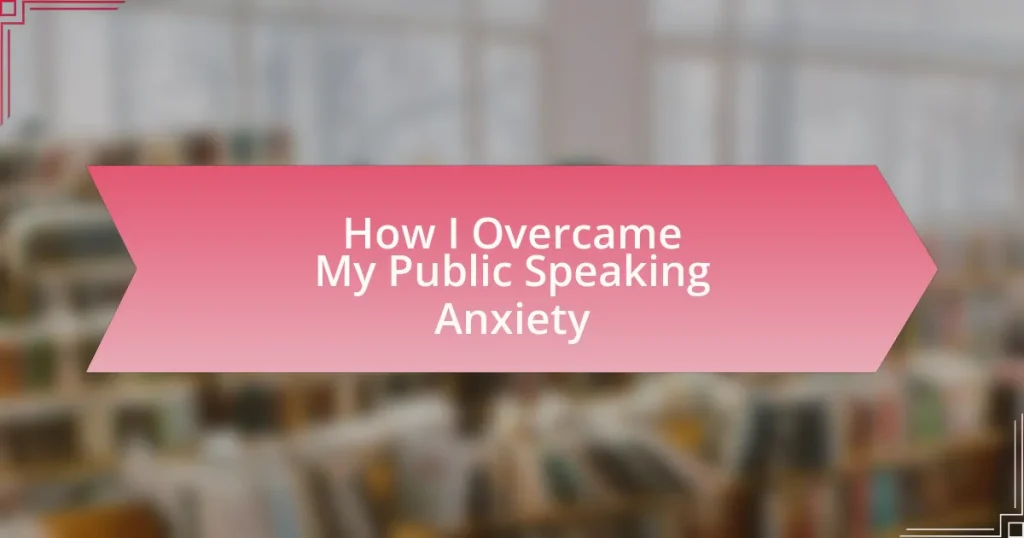Key takeaways:
- Public speaking anxiety is common and can stem from fear of judgment and making mistakes; focusing on connection rather than perfection is vital.
- Overcoming anxiety can enhance self-confidence, facilitate genuine audience connections, and inspire others facing similar challenges.
- Effective strategies for managing anxiety include deep breathing, visualization, seeking feedback, and practicing in front of a small audience.
- Progress in public speaking involves acknowledging personal growth, recognizing the impact of embracing discomfort, and celebrating small victories along the way.
Author: Clara Whitfield
Bio: Clara Whitfield is a captivating storyteller and acclaimed author known for her rich, character-driven narratives that explore the complexities of human relationships. With a background in psychology and a passion for literature, Clara weaves intricate plots that resonate with readers on multiple levels. Her debut novel, “Echoes of the Heart,” received critical acclaim and was a finalist for several literary awards. When she’s not writing, Clara enjoys hiking in nature, experimenting in the kitchen, and engaging with her vibrant community of fellow writers. She resides in Portland, Oregon, where she draws inspiration from the lush surroundings and eclectic culture.
Understanding public speaking anxiety
Public speaking anxiety is a common experience that many of us encounter at some point in our lives. I remember my first time speaking in front of a crowd. My heart raced, palms sweated, and I felt every eye on me like a spotlight. It’s almost as if the fear of judgment can overshadow the excitement of sharing our ideas. Why do we let it control us?
One aspect that contributes to this anxiety is the fear of making mistakes. I used to replay every minor error in my head, turning what could have been a simple slip-up into a nightmare scenario. It’s intriguing to think: what if we shifted our focus from perfection to connection? I learned that engaging with the audience is far more valuable than delivering a flawless performance.
Additionally, the physical symptoms of anxiety can be hard to ignore. I would often feel a tightening in my chest and shortness of breath before stepping onto the stage. But with time, I realized that these reactions are just my body’s way of preparing for something important. Understanding this has allowed me to reframe these feelings not as threats but as signs that I’m about to do something brave. Isn’t it fascinating how our body can be both a source of fear and power?
Importance of overcoming anxiety
Overcoming public speaking anxiety is crucial not only for personal growth but also for enriching one’s professional life. I recall when I first tackled my fear; it felt like a barrier was lifting. As I learned to navigate through my anxiety, I discovered an immense boost in my self-confidence that spilled over into other areas of my life. Isn’t it amazing how conquering one fear can open countless new doors?
Moreover, addressing this anxiety directly fosters genuine connections with our audience. I once spoke at a community event, nervous but determined to share my story. Instead of just seeing a crowd, I began to view them as individuals eager to learn from me. When I embraced vulnerability rather than perfection, I noticed the audience responding more positively. Could it be that authenticity is far more impactful than flawless delivery?
On a broader scale, overcoming anxiety sets an example for others facing similar challenges. When I openly shared my struggles and victories with friends and colleagues, I often saw them resonating with my experiences. It turns out that by conquering my own fears, I was inspiring others to face theirs too. How powerful is the ripple effect of one person’s journey?
Strategies for managing anxiety
Finding strategies to manage anxiety was a personal journey for me. One technique that truly helped was deep breathing. Whenever I felt that familiar tightness in my chest before speaking, I would take a moment to inhale deeply and exhale slowly. This not only calmed my racing heart but also centered my thoughts. Have you ever noticed how something as simple as breathing can shift your mindset?
Visualization was another powerful strategy in my arsenal. Before addressing an audience, I would close my eyes and picture myself delivering a confident and engaging speech. I imagined the faces of my listeners lighting up with interest. By visualizing success, I replaced my fear with anticipation. It’s incredible how our minds can shape our reality; isn’t it fascinating to see this in action?
Lastly, seeking feedback from trusted friends was invaluable. After one particularly nerve-wracking presentation, I asked a close colleague for their thoughts. Their encouraging words boosted my spirits and helped me identify areas for improvement without feeling judged. This constructive criticism was a stepping stone in my growth, and I realized that facing feedback head-on could turn anxiety into opportunity. Have you found anyone in your life who could offer the same support?
Personal experiences with public speaking
Public speaking has been a mixed bag of experiences for me. I vividly remember my first major presentation in college—it felt like my heart was about to leap out of my chest. I was so focused on my anxiety that I nearly tripped over my own words. That moment taught me a critical lesson: sometimes, the fear of failure can overshadow the potential for success. Have you ever been so consumed by nerves that you missed the chance to shine?
Over time, I began embracing the notion that mistakes are part of the journey. I recall a time when I completely blanked during a speech. Instead of panicking, I paused, took a breath, and laughed it off. The audience responded positively, and that experience shifted my perspective. I realized that authenticity resonates more with listeners than perfection ever could. Isn’t it liberating to think that our vulnerabilities can connect us with others?
More recently, I volunteered to speak at a local community event. With every word, I felt more in control, and the initial anxiety transformed into excitement. As I shared my story, I saw nods of understanding from the crowd; it was a powerful moment. That day, I learned that public speaking is not just about conveying information, but about creating connections. How do you think sharing our journeys can impact the people around us?
Techniques I used to improve
To tackle my public speaking anxiety, I adopted several techniques that transformed my approach. One highly effective method was visualization. Before speaking, I would sit quietly and imagine myself confidently delivering my presentation. This mental rehearsal made a remarkable difference; I could almost feel the positive energy of the audience, which helped calm my nerves. Have you ever tried picturing your success before it happens? It can truly set a powerful tone.
Another technique that I found invaluable was practice. I started speaking in front of a mirror, which allowed me to observe my gestures and expressions. I would even record myself to hear how I sounded. This practice not only improved my delivery but also built my confidence. Let me tell you, hearing my own voice without the harsh lens of anxiety was a game-changer. Have you considered recording your practice sessions?
I also leaned on feedback from trusted friends and mentors. After my speeches, I asked them for their honest opinions. Their encouragement and constructive criticism helped me refine my skills and increased my confidence levels significantly. In one instance, a friend’s simple compliment about my storytelling made me realize the impact of connecting on an emotional level. Don’t you think feedback is a crucial part of growth?
Steps to prepare for speaking
When it comes to preparing for public speaking, I found that organizing my content was crucial. I would create an outline that highlighted the key points I wanted to convey. This structure not only made my message clearer but also gave me a roadmap to follow. Have you ever felt lost in your thoughts while speaking? A solid outline can be your compass.
Rehearsing in front of a small audience was another step that put my nerves at ease. I gathered a couple of friends and presented to them, treating it like a real performance. The laughter and engagement I received helped normalize the experience. I still remember the first time I completed a practice session without feeling overwhelmed. It felt like a breakthrough; how do you think familiarity affects your comfort level?
Lastly, I made it a point to incorporate breathing exercises before stepping on stage. Deep, mindful breaths focused my energy and centered my mind. I would visualize releasing any tension with each exhale, making the process almost meditative. It’s interesting to realize how something as simple as breath can ground us in moments of anxiety. Have you ever noticed the way your body responds to stress? Recognizing those signals can be empowering.
Reflecting on my progress
Reflecting on my progress, I can hardly believe how far I’ve come. In the beginning, the mere thought of speaking in front of a crowd made my stomach churn. Now, when I look back, I realize that those moments of fear were simply stepping stones, shaping my determination to improve. Have you ever had an experience where you surprised yourself with how much you’ve grown?
Each speaking engagement feels less like a chore and more like an opportunity. I recall my first public speaking event after months of practice. Instead of the paralyzing anxiety I used to feel, I experienced a sense of excitement—like embarking on a new adventure. I truly believe that every time I stepped out of my comfort zone, I gained a piece of my confidence back. Isn’t it incredible how discomfort can lead to personal growth?
As I reflect on the journey, I recognize that progress isn’t just about overcoming anxiety; it’s about embracing the process. The little victories matter, too—like nailing a tricky phrase or connecting with the audience. I often find myself smiling, thinking of those moments when I was able to share not just information but also parts of myself. How does it feel to share your story with others? There’s a unique connection that forms, and it’s something I cherish deeply.















